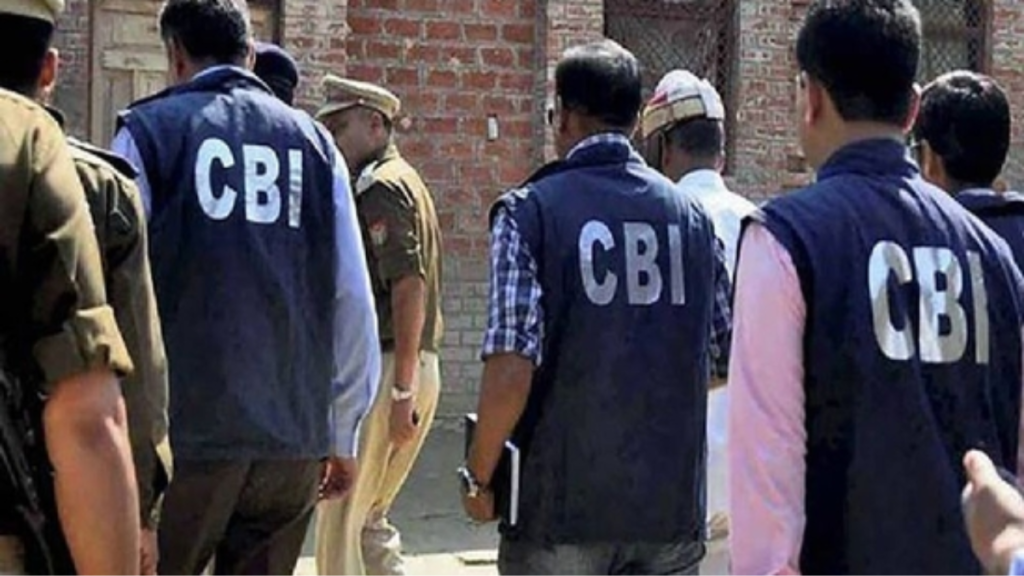CBI has widened its probe into the purported Chhattisgarh Public Service Commission (CGPSC) recruitment scandal by conducting new searches at five places within Raipur and Mahasamund districts. The raids, conducted on Thursday, are part of a larger campaign by the Central Bureau of Investigation to unravel systemic abuses in state-level recruitments during the previous Congress-led government in the state.
The agency, in a statement on Friday, said that searches were carried out at three locations in Raipur and two in Mahasamund. These properties are said to belong to five people whose names emerged during the ongoing investigation into malpractices in CGPSC recruitment procedures for high-level bureaucratic positions between 2020 and 2022. The CBI seized a number of incriminating documents and digital evidence pertaining to the manipulation of the selection process during the raids.
The investigation is part of a broader inquiry that was initiated in July 2024, when the CBI formally took up two cases related to irregularities in the appointment of Deputy Collectors, Deputy Superintendents of Police (DSPs), and other senior administrative officers. The investigation was preceded by charges of mass cheating, paper leaks, and nepotism, all of which are said to have occurred under the noses of top officials in the state’s public service commission.
The CBI has arrested seven people so far, including the ex-chairman of CGPSC Taman Singh Sonwani and a few of his immediate family members. His nephews Nitesh Sonwani and Sahil Sonwani are among the people arrested, both of whom had obtained the position of Deputy Collector and DSP respectively. Also arrested are Lalit Ganvir, the then Deputy Controller of Examinations in CGPSC, and Shravan Kumar Goyal, Director, Shri Bajrang Power and Ispat Ltd, and his son Shashank Goyal and daughter-in-law Bhumika Katiyar.
The agency’s charge sheet submitted before a special court in Raipur on January 16 says that Taman Singh Sonwani was the key person in the conspiracy and had distributed question papers among his nephews. Officials state that the alleged corruption went beyond nepotism within the family; it spilled into a criminal conspiracy among prominent private sector leaders. Sonwani and Ganvir supposedly joined forces with Shravan Kumar Goyal in hatching a plan to divulge confidential exam documents, which were later passed to Goyal’s daughter-in-law and son—who proceeded to acquire prime administrative slots.
The charge sheet also adds that names of additional CGPSC officials and candidates may come up as the investigation is ongoing. The CBI insists that this is merely the tip of the iceberg and that its priority at present is to identify the extent of the recruitment scam syndicate and the roles played by different intermediaries.

CBI Question: How is CBI ramping up its enforcement against organized exam malpractices in state recruitment authorities such as CGPSC?
The CBI‘s increased scrutiny of the CGPSC recruitment scam is a major shift in the agency’s operational priorities—most notably its increased emphasis on eliminating white-collar crime in the public sector employment arena. This case has received national attention not just because of the seniority of the posts but also because of the active involvement of top officials and powerful private actors.
The fresh raids focused on people whose connections to the original plot were revealed from online communication records, financial patterns, and testimony from those who were already detained. According to CBI sources, a number of laptops, cell phones, and handwritten documents were seized during the recent raids and are being analyzed forensically to authenticate their contents and generate additional leads.
These disclosures are politically inconvenient for Chhattisgarh, which has just witnessed a change of government through elections. The scam, which is said to be connected to the tenure of the last Congress-led state government, has led the ruling party to distance itself from the accused while inviting the central agency’s investigation in the spirit of administrative transparency.
The CGPSC has been a suspect organization for years for its murky selection procedure. Still, for the first time ever, it is a central investigation agency that has made major strides to disband what seems to be a well-established pattern of corruption in the state’s most significant choice forum. The CBI has stated that it will not rest until all beneficiaries of the fake selection procedure are identified and put behind bars.
Besides summonses and raids, the CBI is also set to call a few serving CGPSC officials for interrogation. According to sources, at least four more people could soon join the list of suspects pending evidence of their participation through data collected during the on-going raids.
Although the Chhattisgarh government has promised total cooperation with the central agency, there are doubts raised about the administrative precautions—or the absence of them—that enabled such a lapse. State educational and employment activists have demanded an exhaustive audit of all exams held by CGPSC between 2018 and 2023.
The scandal has had a serious effect on public confidence in state recruitment agencies. Numerous candidates who genuinely sat for the CGPSC exams in the affected years are now calling for all the selections to be re-checked or re-conducted to ensure equity.
While this is going on, the CBI will also make a supplementary charge sheet in a few months as more evidence and witness statements emerge. A top CBI officer underlined that the agency is “committed to meritocracy in government recruitment and will pursue the case to the last conspirator.
In the larger picture, the CGPSC scam has served as a grim reminder of how corruption at the systemic level in recruitment exercises can weaken governance and demoralize worthy candidates. With the CBI now taking charge firmly, the next few months may uncover just how deep the scam’s roots are—and whether this probe sets a precedent for similar investigations in other state commissions.
ALSO READ
“Delhi Government on Shocking Fee Violations in 1,600 Private Schools”
Pingback: Why The UK is emerging as a highly preferred destination for Indian students in 2025? -